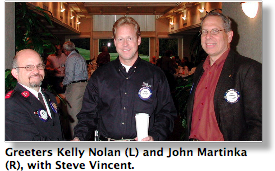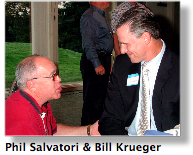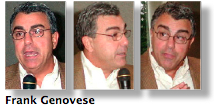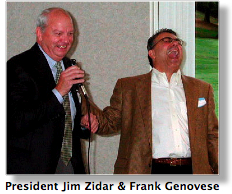 |
|
||||||||||||
Vol. 19, No. 11, SEPTEMBER 19, 2006 |
|||||||||||||
| THE FRIDAY PROGRAM: Ste. Michelle Estates (Frank Genovese) | Friday Potpourri | Notes From the BBRC Board | Bill Krueger Returns for a Visit | Rotary Night at the Pacific Science Center: "Dead Sea Scrolls" | Directory Photo Shoot | Web Fun | |||||||||||||
Friday's Program:
Bob Holert introduced our distinguished guest speaker, Frank Genovese, VP and National Sales Manager for Ste. Michelle Estates. Recently, Bob’s wife Kathy received a call that cousin Frankie would soon be in town. Frankie had been in the wine and spirits business for 35 years in New Jersey — in that state, nobody sells alcoholic beverages of any type except in state-controlled liquor stores. “Frankie” moved to the Seattle area after just a couple of visits, accepting a promotion as national sales manager for Ste. Michelle Estates, the internationally renowned producer of fine wines headquartered nearby in Woodinville. READ MORE 
Kelly Nolan greeted and led the invocation and pledge, giving us reminders of how to conduct ourselves in our daily lives. John Martinka introduced the visiting Rotarians and guests. We had five visiting Rotarians, including a new visitor from Hungary and the return of Mr. Tanaka from Osaka, Japan. We also welcomed frequent visitor John Matheson from Seattle Four, and Joyce and Norm Bottenberg of the Sammamish Rotary Club. The club gave a special welcome back to Brian Heimbigner, a former BBRC member who now lives in Georgia, and another to television sports personality Bill Krueger, who spoke about the future of the Mariners, as well as his involvement in the Cure Autism Now organization (see article). Bill Krueger Returns for a Visit Mariners Update
With regard to the Mariners, Bill relates “things are tough in the West.” With understatements like that, we now know why he gets the big bucks in the broadcasting business. We’re in last place, and with the tough competition in our division, that position is difficult to break out of. With this season’s dismal performance record, Bill states that “everything with them Mariners is up for review.” The task ahead is to identify young players who can pick up the load going forward. One challenge is that the Mariners are in the top 20% for salary spending, but they are performing in the bottom 20%. Where to look? Bill discussed the status of Hargrove, stating he has another year in his contract and implying that not all the problem lies with coaching. Bill’s conclusion: Hargrove is not the best solution, but he is not the reason the Mariners aren’t where they need to be. Even so, Hargrove may end up taking the fall; time will tell. At a tactical level, the club needs to move runners once they are on base. Power is not the issue; chemistry is just not there to deliver the right results. Communication is a critical facet of this issue: players are just not talking with each other in a manner that builds teamwork. In short, the club is too passive about winning. What should they do? Bill gave his wisdom on needs for acquisitions and identifying high value trades of current Mariners who don’t fit in the team’s lineup. Interestingly, the communication issue touches the international flavor of the team: Bill points out that the club has made great efforts to accommodate Ichiro and meet Japanese language needs, but it may not have adequately accommodated the Latin players. The team is playing to an international television audience as a huge portion of its income; it needs to accommodate and cultivate the international aspects of the team. • • • Cure Autism Now
Yet, Bill sadly noted that this does not solve the entire autism problem. The majority of autistic children will never have an independent life. Families of autistic children face unbelievable challenges: marriages with autistic children have a 90 percent divorce rate. The disease fractures families both emotionally and financially. Bill then showed a short informational video that showed the state of the effort to cure autism. The key is to support research and look for means to prevent the disease. Parents of autistic children are the ones who drive the entire movement. Bill’s organization is waging a war on autism that affects one out of every 166 children; every 22 minutes, another child is born with autism. One notable accomplishment of the movement is in the field of research called the Autism Gene Research Exchange. It provides a new paradigm for collecting samples, researching, and sharing results. This interaction accelerates the learning in the medical field, delivering promising progress. Bill closed with a pitch for a 5K fundraising walk on September 30th that will put more focus on the issue and help raise needed dollars. BBRC members are encouraged to participate, and if you can’t walk, you may still pledge. For those who are interested, please follow this weblink: http://www.walknow.org Friday's Program:
Bob Holert introduced our distinguished guest speaker, Frank Genovese, VP and National Sales Manager for Ste. Michelle Estates. Recently, Bob’s wife Kathy received a call that cousin Frankie would soon be in town. Frankie had been in the wine and spirits business for 35 years in New Jersey — in that state, nobody sells alcoholic beverages of any type except in state-controlled liquor stores. “Frankie” moved to the Seattle area after just a couple of visits, accepting a promotion as national sales manager for Ste. Michelle Estates, the internationally renowned producer of fine wines headquartered nearby in Woodinville. Frank began by mentioning that both he and his brother were Paul Harris fellows. (Just a quick aside from your Club Service II Director: "Hmmm, it seems he has the gene. Why isn’t he joining our club to follow the family tradition?" Now, back to the news.) Frank introduced his topic with a discussion of icons of the Pacific Northwest and how Washington wine, and specifically the Ste. Michelle Winery, are becoming increasingly important parts of the cultural landscape here. He established that he was indeed in friendly territory by stating that United States per capita consumption of wine has now grown to three gallons per person each year. (Many Rotarians revealed their own complicity in this statistic by wondering out loud, “Only three?"). The adult consuming population is also growing. Seventy percent of the wine market is currently the “baby boomer” generation. Beer, the previous leading beverage of preference in the U.S., has been losing out with the younger crowds to the increasing popularity of wine: Even young guys are now drinking more wine and less beer. Why? Because, young ladies are drinking more wine.
What are the industry challenges? Wine from other regions and countries — California, Australia, France, Italy, and Germany compete for consumer dollars. Also, the channels of distribution and local and state laws provide sales challenges. For example, the pending outcome of the legal issue with Costco could open the retail market even further in states like our own. Regions in importance of sales currently rank as follows:
We are currently at 16% of the market and rapidly growing. More importantly, the quality of Washington wine is increasing. We have a weather dynamic in eastern Washington that makes perfect wine growing conditions: warm weather in the days and cooler evenings, with far lower humidity than in other parts of the country. Frank pointed out the same summer weather that makes Washington ideal for relaxing out on a boat makes grapes enjoy the climate too. That translates to Washington currently marketing 29.4% of the wines that score 90 or above in wine competitions (on a scale of 100). We are number one in quality! Washington’s growing excellence in the wine market is gaining recognition in the trade press.The Wine Advocate has noted that Washington is the wine region that as arrived; three of five of the featured wines were Ste. Michelle wines. Frank said that these third party endorsements are crucial to the growing prestige of his company and its products.
Frank was quick to point out that the Washington wine commission “gets it” and is now supporting a national publicity campaign for Washington wines. He cited the statistic that 60% of people who buy Washington wine don’t know it came from here. That is about to change through a well-placed national campaign. Frank then wrapped up with a discussion of sales processes of his company and how that translates to the central philosophy that nothing happens until you interact with another human being. He quickly pointed out that the company’s view toward interpersonal interactions in many ways parallels Rotary’s Four-Way Test. In closing, President Jimmy Z. thanked Frank with a card signifying a donation of food to local food banks in Frank’s name, and pointing out that our membership rolls just happen to have an opening in the classification of “wine national sales.” FEELING OLD TODAY? The people who are starting college this fall across the nation were born in 1988. They are too young to remember the space shuttle blowing up. Their lifetime has always included AIDS. The have always played music on CDs, not LPs. They have always had an answering machine They have always had cable TV. Jay Leno has always been on the Tonight Show. Popcorn has always been cooked in the microwave. They never took a swim and thought about Jaws! They don't know who Mork was or where he was from. They never heard: "Where's the beef?", "I'd walk a mile for a Camel", or "De plane, de plane!" McDonald's sandwiches never came in styrofoam containers. They don't have a clue how to use a typewriter. • • • DEER HUNTING It was Sunday morning when Bill, an avid hunter, woke up ready to go nail the first deer of the season. He went down to the kitchen to get a cup of coffee and, to his surprise, he found his wife, Judy, sitting there, fully decked out in camouflage gear. Judy smiled, "I'm going hunting with you." Bill, though filled with reservations, reluctantly agreed to take her along.
|
|||||||||||||
|

 Larry will be set up from 6:45AM till about 7:10AM. If you don't have a photo in the online Directory, or if you would like to update your photo, show up a little early for the meeting on September 29, and get your picture taken then!
Larry will be set up from 6:45AM till about 7:10AM. If you don't have a photo in the online Directory, or if you would like to update your photo, show up a little early for the meeting on September 29, and get your picture taken then! 
 How do you keep the absolute attention of 80 Rotarians for 30 minutes? You talk about wine without explicitly stating there won’t be free samples at the end of the talk — that way there is always hope.
How do you keep the absolute attention of 80 Rotarians for 30 minutes? You talk about wine without explicitly stating there won’t be free samples at the end of the talk — that way there is always hope.  Fox News sports analyst Bill Krueger visited the BBRC Friday with two separate messages: he gave his “state of the Mariners” assessment, then he provided the club with an update on his cause that has become a true passion in his life: “Cure Autism Now.”
Fox News sports analyst Bill Krueger visited the BBRC Friday with two separate messages: he gave his “state of the Mariners” assessment, then he provided the club with an update on his cause that has become a true passion in his life: “Cure Autism Now.”  Bill Krueger is also a passionate advocate of the organization and movement “Cure Autism Now.” His passion stems from his own family experience: Bill’s 13-year-old daughter was diagnosed with autism when she was three and a half. Bill proudly claims that his daughter “is a miracle.” She has full language capability, she is in school, and she has friends. He cites the progress as the result of families, schools, and medicine following more “best practices” in recent years. When a child is identified early, there is an opportunity to provide them more of the help that is crucial to their development.
Bill Krueger is also a passionate advocate of the organization and movement “Cure Autism Now.” His passion stems from his own family experience: Bill’s 13-year-old daughter was diagnosed with autism when she was three and a half. Bill proudly claims that his daughter “is a miracle.” She has full language capability, she is in school, and she has friends. He cites the progress as the result of families, schools, and medicine following more “best practices” in recent years. When a child is identified early, there is an opportunity to provide them more of the help that is crucial to their development.  How do you keep the absolute attention of 80 Rotarians for 30 minutes? You talk about wine without explicitly stating there won’t be free samples at the end of the talk — that way there is always hope.
How do you keep the absolute attention of 80 Rotarians for 30 minutes? You talk about wine without explicitly stating there won’t be free samples at the end of the talk — that way there is always hope.  The higher price points in the wine market have also been growing remarkably. The over-$15-per-bottle wines have been growing in sales a whopping 30% annually; under-$12 wine is growing at 22%. Frank interprets this to mean that not only are Americans consuming more wine, but they are being more selective of quality, going for the higher price products at increasing rates.
The higher price points in the wine market have also been growing remarkably. The over-$15-per-bottle wines have been growing in sales a whopping 30% annually; under-$12 wine is growing at 22%. Frank interprets this to mean that not only are Americans consuming more wine, but they are being more selective of quality, going for the higher price products at increasing rates.  The company is growing in its “portfolio” as well. Chateau Ste. Michelle is the core of the business, but the company owns many other popular brands, including Columbia Crest and Domaine Ste. Michelle. Ste. Michelle, due to its partnership with German winegrowers, is now the largest Riesling producer in the world. Recent acquisitions include Canoe Ridge, Spring Valley (Walla Walla), and Erath, an Oregon winery that is the largest producer of pinot noir.
The company is growing in its “portfolio” as well. Chateau Ste. Michelle is the core of the business, but the company owns many other popular brands, including Columbia Crest and Domaine Ste. Michelle. Ste. Michelle, due to its partnership with German winegrowers, is now the largest Riesling producer in the world. Recent acquisitions include Canoe Ridge, Spring Valley (Walla Walla), and Erath, an Oregon winery that is the largest producer of pinot noir.